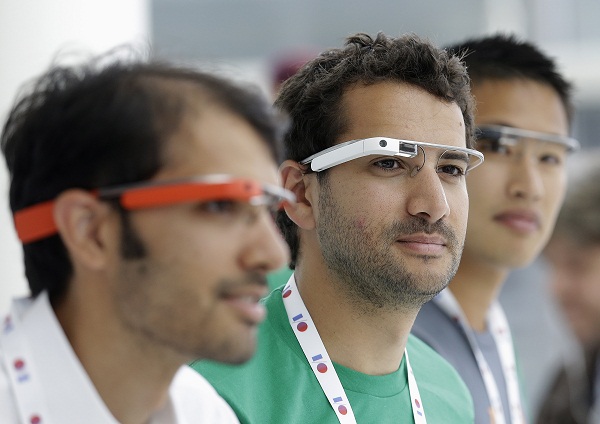Google Glass reborn for the workplace

Google Glass team members wear Google Glasses at a booth at Google I/O 2013 in San Francisco, Wednesday, May 15, 2013. AP FILE PHOTO
SAN FRANCISCO—After spending two years on the sidelines, Google Glass internet-linked eyewear is back in the game, this time aimed at helping workers do their jobs.
General Electric, Volkswagen, and Boeing are among more than 50 businesses taking part in testing a Glass Enterprise Edition in a limited program, project lead Jay Kothari said Tuesday in a blog post.
Three years ago, an Explorer program let developers and other “early adopters” try out the glasses, in an early test of potential business applications. But that initiative was eventually put on ice in 2015.
“Workers in many fields, like manufacturing, logistics, field services and health care find it useful to consult a wearable device for information and other resources while their hands are busy,” Kothari said.
The team at Glass, which is back to being part of the X lab innovative new technologies unit at Google-parent Alphabet, has spent the past two years customizing the eyewear for workers.
Feedback from businesses taking part in the program has prompted a decision to make Glass Enterprise Edition available to more companies, according to Kothari.
Financial details of the program were not disclosed.
After the Explorer program ended, corporate restructuring put the division devoted to “moonshots” such as internet-linked eyewear and self-driving cars under corporate parent Alphabet.
Glass — hotly anticipated by some, mocked by others — became available in the United States in early 2014 to anyone with $1,500 to spare and a desire to become an “explorer.”
BACKSTORY: Google Glass taking fans closer to the action
The Glass test, or beta, program was later expanded to Britain.
Glass connected to the Internet using Wi-Fi hot spots or, more typically, by being wirelessly tethered to mobile phones. Pictures or video could be shared through the Google+ social network.
Google faced a challenge to burnish the image of the consumer version of Glass, which triggered concerns about privacy since the devices are capable of capturing pictures and video.
A mixed reality market has since begun to blossom.
HTC, Sony and Facebook-owned Oculus compete with virtual reality gear, and Microsoft has unveiled HoloLens augmented reality visors that hold promise for workplace applications.